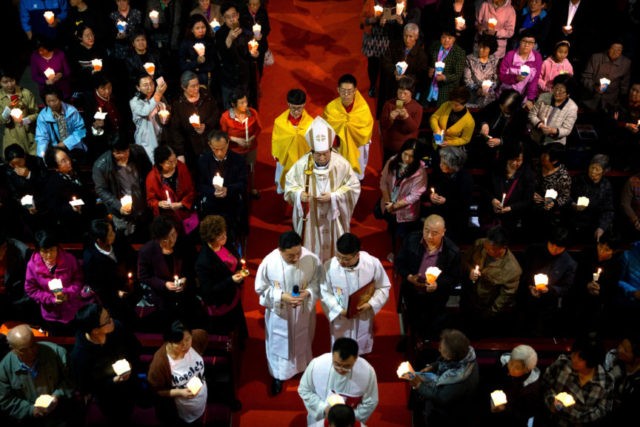China’s state-run Global Times newspaper reported Wednesday that the nation’s religious regulation agency has drafted new rules to “protect foreigners’ religious beliefs” by demanding they provide extensive documentation when participating in “group religious activities.”
The publication of these new rules is the latest chapter in a years-long campaign by Communist Party leader Xi Jinping to “Sinicize” religion – make it more Chinese by making it less threatening to the Communist Party. The State Administration of Religious Affairs controls all five legal religions in the country – Taoism, Buddhism, Catholicism, Protestant Christianity, and Islam – and has increased its efforts to ensure that all those involved in the leadership of religions are approved by the Communist Party.
The Global Times reports that the new rules will affect foreigners participating in large group worship of all religions (at least 50 people attending) and are meant to “protect foreigners’ religious beliefs.” The rules require foreigners visiting for religious events to “appoint at least three conveners who would apply for group religious activities at religious venues or temporary sites.” They must also provide extensive documentation to the Chinese government to allow for full monitoring of all their activities within China.
Chinese citizens are now banned from such activities organized by foreigners, but Chinese nationals representing the government must preside over any religious activities organized by foreigners, the regulations require, according to Global Times.
Radio Free Asia (RFA), citing the official notice on the religious affairs agency site, reports that the rules have not yet been passed, but the government is seeking “input” from the public on how to improve upon the draft laws. The administration says on their site that the regulation is necessary to prevent cultural invasion of religion in China by “hostile foreign forces.”
RFA notes that laws restricting the assembly of religious groups are already significantly rigorous. “Foreigners are currently also barred from preaching or teaching, other than at the invitation of state-backed institutions, nor must they mentor or train Chinese religious staff and believers,” according to the outlet. They are also banned from distributing almost all religious material in the country and cannot conduct missionary activities.
Zhu Weiqun, former head of the Ethnic and Religious Affairs Committee of the National Committee of the Chinese People’s Political Consultative Conference, told the Global Times that the Chinese communist regime is concerned that “the number of foreigners living in China has increased, and many of them have religious beliefs.”
To prevent “some foreign forces from using religion to control Chinese religious groups or conduct subversive or political activities,” the Communist Party must have full control and knowledge of what religious people are doing at all times, especially if they are gathering to worship.
Despite efforts by Xi’s regime to limit Chinese people’s exposure to religion, China is currently experiencing a boom in worship. Christianity, in particular, has grown increasingly attractive, and triggered the development of “house churches” – private sites of worship unaffiliated with the Vatican or the Three-Self Patriotic Church, the Protestant entity controlled by the government in China.
Including “house church” members, there are an estimated 100 million Christians in China, outnumbering the 80 million members of the Communist Party. Islam in western Xinjiang province, the majority religion of the Uighur minority, is also experiencing a revival in that province as it is affiliated with the Uighur minority and has come under severe crackdowns by Beijing in the last year.
One member of a house church, Xu Yonghai, told RFA that he believes the new regulations for foreigners will bring about a more generalized crackdown on religious leaders in the country.
“They are bringing out new guidelines to give a reason why they are stepping up the suppression [of religious activities],” he argued. “I think this indicates that controls are going to get much tighter, including for foreigners spreading the gospel in China. … Things will get more difficult; some of our brothers and sisters from South Korea have already been affected, after coming to China and working very hard to set up churches.”

COMMENTS
Please let us know if you're having issues with commenting.